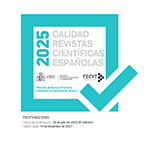Spanish documentary series (1990-2010): Between information dissemination and awareness
Abstract
This article analyzes the Spanish documentaries broadcasted on generalist television networks (TVE1, TVE2) and private networks (Antena3, Telecinco, Cuatro and La Sexta) from the arrival of private competition to the introduction of DTT (1990-2010), in order to determine if spectacularization, which extended through all television content in those years, distanced the documentary from its essential and original informative function. A content analysis is used to assess the importance of documentary series in programming (time slots, networks, nationalities, genres), as well as a textual analysis of Spanish productions to examine themes and approaches, in addition to the presence of sensational elements and creative proposals. It is shown that the documentary genre had a minor presence in the television offer of the time with the exception of public channels (TVE2). Spanish documentary productions experienced important changes in the way of approaching different themes and in their presentation, without losing its informative essence; it became a bolder, combative, militant genre, oriented -above all- to stir consciences
Downloads
Article download
License
In order to support the global exchange of knowledge, the journal Estudios sobre el Mensaje Periodístico is allowing unrestricted access to its content as from its publication in this electronic edition, and as such it is an open-access journal. The originals published in this journal are the property of the Complutense University of Madrid and any reproduction thereof in full or in part must cite the source. All content is distributed under a Creative Commons Attribution 4.0 use and distribution licence (CC BY 4.0). This circumstance must be expressly stated in these terms where necessary. You can view the summary and the complete legal text of the licence.










